PHOTO |
 China
World
Newsmaker
Slides
Weekly Photos
Share Your Photos
Special China
World
Newsmaker
Slides
Weekly Photos
Share Your Photos
Special
|
|
 |
Large Medium Small |


Editor's note:
The past year since the Copenhagen climate talks has witnessed a fad called "low carbon". It seems the need to help the environment is more urgent than ever, and we can't wait to show our concern and care for the planet. Following are 10 examples of Chinese people showing how to live a life that is healthy, moderate and environment friendly.
Click for more "top ten" topics


Running green
|
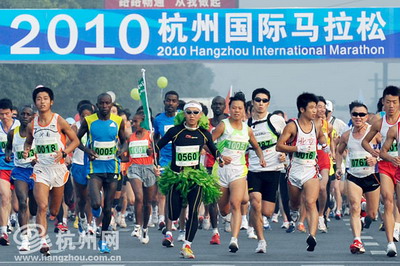 |
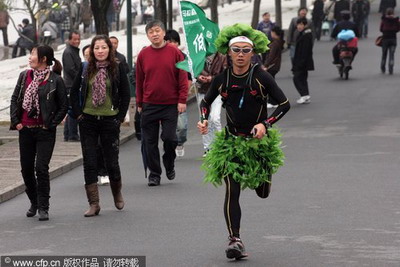 |
A shaven-headed contestant in a marathon held in Hangzhou, capital of Zhejiang province on Nov 7 drew widespread media attention. Calling himself "shaven-head and green leaf", the athlete ran the marathon around Xihu Lake dressed up in green leaves and carrying a green flag with "low carbon" written in Chinese.
Chen Jun- his real name- said he shaved his head so less water is needed for washing his hair. The marathon ended on Nov 7, but Chen came back to Hangzhou days later, and ran around Xihu Lake dressed up in the same costume for the next 15 days "to promote low-carbon lifestyle". [Photos/ hangzhou.com.cn and CFP]


|
 |
 |
A typical Chinese wedding features a motorcade decorated with pink ribbons and red roses. But a couple in Wuhan, capital of Central China's Hubei province, wanted a different and more economical wedding.
People waiting in a bus station in Wuhan on Nov 13 were surprised when a bus decorated with balloons and wedding pictures pulled in. Tang Li, the bride, was working as a bus driver. She was approved by her boss to use a bus for the wedding vehicle. Thus instead of sitting in a rented limo leading a line of cars, Tang drove her husband and their friends to a happy terminal. [Photos/cjmp.cnhan.com and cnhubei.com]


|
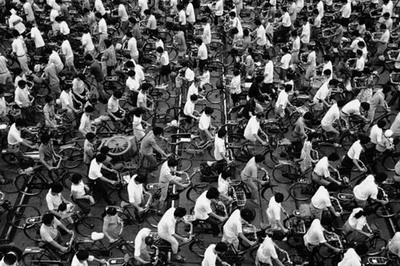 |
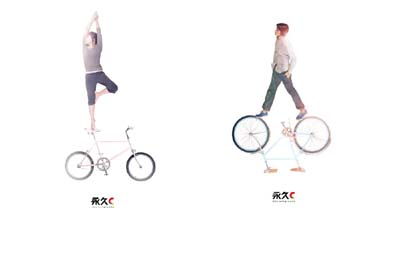 |
A Forever or Yongjiu bike was a necessity for a Chinese family in the 70s and early 80s. Though fewer bikes are seen on the street nowadays, the old brand saw a chance of reviving this year with help of a team of designers, some of whom have studied in Europe and wanted to bring the environmentally friendly ride back to the once "bicycle kingdom".
The team came up with the Cforever bicycle series. With bright color, lighter weight and a touch of retro style, the series soon became popular, and young people began posting online pictures of themselves gesturing with a Cforever bike.
The team named fans of the series "Qingke"or "chic", meaning "people who enjoy riding bikes".


|
 |
 |
A 24-year-old British man rose to fame after failing in a popular Chinese dating show. Wang Doufu, as he called himself in Chinese, was declined by all the 24 single women candidates after his video introduction was played.
In the video, the student and DJ said he had salvaged a bed and other stuff from the street. When asked if he had any money, he said in not-so-fluent Chinese that he did recycling not because he was short of cash, but because he wanted to help prevent global warming.
The show ignited heated discussions on the Internet. Some said maybe the candidates thought he was poor and rejected him. Others said he was rejected together with his environment-friendly lifestyle. Despite his failure, he reminded us in his own way of the urgent need to protect the environment.


|
 |
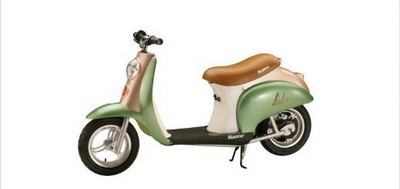 |
The recent fossil fuel shortage seems to have encouraged car-owners to live a low-carbon life. Mr Song in Zhuhai, Guangdong province, ditched his BMW as the time spent waiting in line to fuel was "torture", Southern Metropolis Daily reported. Song turned to the enjoyment of riding his electric bike to and from work every day while dressed in a suit.
Though sources from Sinopec and PetrolChina said the oil shortage will be relieved by the end of December, car owners like Song have shown how to enjoy time without a car.
Related readings:
 China's private refineries blame oil shortage on monopoly
China's private refineries blame oil shortage on monopoly  Oil giants monopoly blamed in diesel shortage
Oil giants monopoly blamed in diesel shortage  Diesel shortage might end in December
Diesel shortage might end in December


|
 |
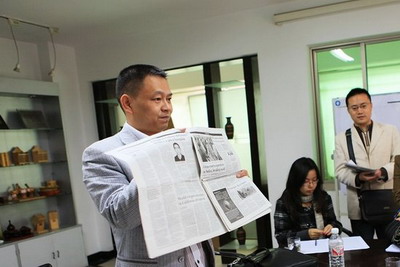 |
Chen Faqing, an ordinary farmer from Hangzhou, capital of Zhejiang province, donated 250,000 yuan ($37,600) to the Mexican government on Oct 19 for the UN Climate Change Conference held in Cancun. When asked by the Mexican ambassador to China what he wanted, Chen said, "I want what the whole human race want, I want a better Earth."
Chen then donated 270,000 yuan to UN's Intergovernmental Panel on Climate Change (IPCC) on Nov 9, and spoke to President Pachauri on the phone on Nov 17.
He also bought an advertisement on environment protection on magazines and newspapers, including The Wall Street Journal and The Economist, and was guaranteed a stand to show the ad at the Climate Change Conference.
Together Chen has spent about one million yuan for his cause. [Photos/qq.com]
Related reading: Farmer turns climate activist


Housing green
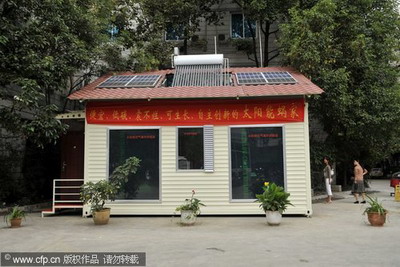 |
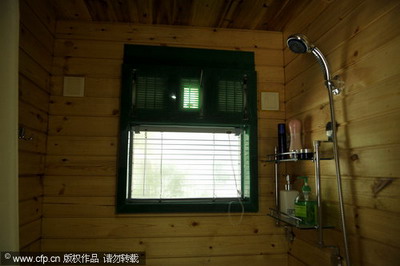 |
A retired thermodynamic engineer and his teammates in Kunming, capital of Yunnan province, built a 10-square meter movable house powered by solar energy. On the roof are four solar panels providing energy for hot water, ventilation, heating and illumination for the house, in which there are a bathroom, a living room and a bedroom.
Zhu Peishi and his team designed and built the house in 10 months, and got several patents for his idea. Zhu said it costs just three hours and less than 20,000 yuan ($3,000) to set up the house, making it a good choice for rural residents, army and disaster survivors. "You can place such houses together or even stack them up if you want more room." [Photos/CFP]

 Green hour
Green hour
|
 |
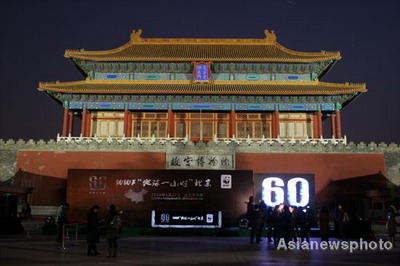 |
Thirty three Chinese cities joined in the Earth Hour 2010 movement on March 27. On that night, Li Bingbing, actress and UNEP goodwill ambassador in China, counted down with the audience gathered in front of the Palace Museum before the Forbidden City turned dark for an hour along with the Bird's Nest, the Water Cube and the National Centre for the Performing Arts. The Oriental Pearl in Shanghai also turned off its light at the same time.
After the Copenhagen climate talks, Chinese cities have shown an increasing interest in low-carbon projects, and at least 100 of them said they want to be low carbon, according to China Youth Daily. [Photo/Asianewsphoto]

 Simple green
Simple green
 |
 |
Studded with sophisticated low-carbon technologies, Shanghai Expo also embraced a simple rule to advocate environment protection: Smoking was only allowed in the Expo Park in designated smoking areas. In order to ensure the rule was obeyed, volunteers would sometimes encourage smokers to smoke at the designated area by giving them an honor badge of "environment protector".
As a contracting party of the framework convention on tobacco control, China pledged to ban smoking in indoor public places by January. In a news conference, the Ministry of Health said China's health administrative departments and the medical system will be smoke-free in 2011.

 Green "passport"
Green "passport"
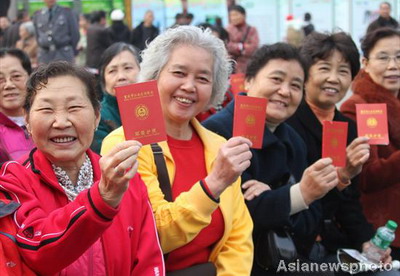
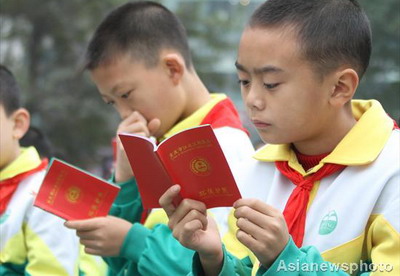
Residents in Southwest China's Chongqing received a red booklet called "environment protection passport" on Nov 20. Issued by the local environment department in a campaign to establish Chongqing as a model city of environment protection, the "passport" contains tips to protect the environment and relevant laws, and reminds holders to be aware of green issues, such as to save water and not to eat wild animals. [Photo/Asianewsphoto]